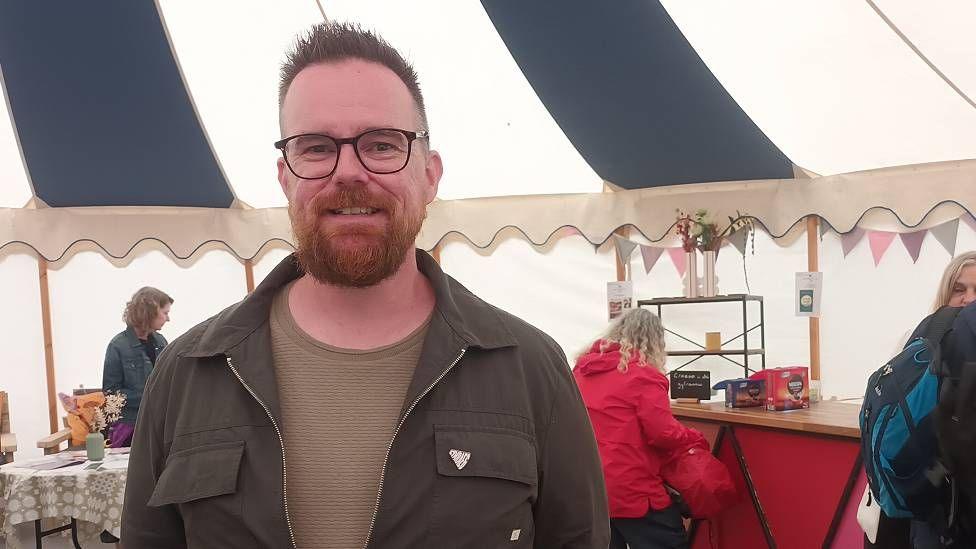Student learned Welsh to ‘connect with roots’

Kierion Lloyd, 40 is part of a number of people who are studying Welsh later in life
- Published
Having been born in Wales but spending much of his childhood abroad, Kierion Lloyd began learning Welsh during adulthood to “connect with” his roots.
Mr Lloyd, 40, began learning the language six years ago, part of a number of people who are studying the language later in life.
“I want to try and normalise speaking Welsh as much as possible,” he said, adding there had been a lot of “shame” connected with the language in the past, referring to the Welsh Not, a 19th century punishment in schools if a student was heard speaking Welsh.
The Welsh government has set a target of one million Welsh speakers by 2050, and has published a law aimed at helping it to achieve this aim.
Eisteddfod meets funding goal on return to town
- Published3 August 2024
How to teach a language you cannot speak fluently
- Published28 November 2023
Lord's Welsh language 'fascism' remark criticised
- Published14 March 2024
Other measures include the establishment of the National Centre for Learning Welsh, which says it has seen a 33% increase in learners since 2017.
In 2021, an estimated 538,000 people in Wales aged three and over – 17.8% of the population – said they could speak the language, the Office for National Statistics found.
Mr Lloyd is part of the efforts to increase the number of Welsh speakers, beginning to learn the language in his mid-30s.
With his father in the army, Mr Lloyd spent much of his youth overseas, and although he spent five years at a school in Wales, felt he had "missed out" when it came to connecting with his Welsh heritage.
He said learning Welsh during adulthood has "opened so many doors" for him.
"I’ve developed a fantastic group of friends... and I’ve discovered a whole genre of music I wouldn’t have otherwise connected with," he said.
Mr Lloyd said that when he started learning his aim was to be fluent, but that is no longer the case, and that his aim is now to continue learning "every day".
Asked why learning Welsh was important to him, he described it as "part of our culture, our history".
He said historically there had been efforts to suppress the Welsh language, including the Welsh Not.
Speaking at the National Eisteddfod in Pontypridd, Mr Lloyd said the Welsh national cultural event had been an important opportunity for him to learn the language, describing it as a "safe" and "very warm" space to learn.
Mark Adey, 54, is another to have started learning Welsh during adulthood, beginning in his mid-40s when his daughter was learning Welsh at school.
"I think you often take learning for granted – if you don’t train your mind you get rusty," he said.
He described the Eisteddfod as a "great opportunity to really immerse myself in the language".
"And the community is so supportive. They’ve really helped me to improve my confidence," he said.

Welsh language speakers can be introduced to new music, such as Welsh-language rock band Gelert
The National Centre for Learning Welsh, external now has 17,000 people learning the language, said its chief executive Dona Lewis, adding there has been "a lot of interest" from young people in particular.
Ms Lewis said the Covid pandemic had "drastically changed" the education sector, with many classes now being conducted online, making them more accessible.
The eisteddfod is also an important opportunity to attract new Welsh speakers, she said.
"They can engross themselves in the environment and practice, and it’s a place where people are very welcoming of new people learning it," she said.
Kathy Jones, 56, has been a tutor with the centre since 2012, having started learning Welsh as an adult.
"You don’t have to speak Welsh to be Welsh, but it does enrich the feeling of being Welsh," she said. "It gives you a real sense of pride."
She said the key to learning for her was to "really throw herself" into learning a new language, and encouraged new learners to do the same.
"It’s important to practice something you have learned straight away. Even if it’s only a few words - diolch [thank you] or bore da [good morning], just use them regularly, then build it slowly from there," she said.